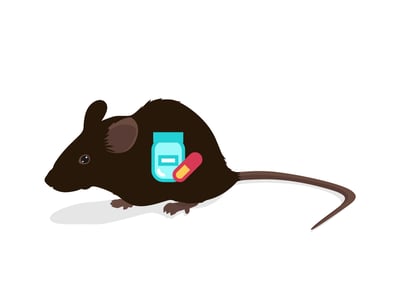FORCE's eXamining the Relevance of Articles for You (XRAY) program looks behind the headlines of cancer news to help you understand what the research means for you.
XRAY is a reliable source of hereditary cancer research-related news and information.
Learn more about the XRAY program
Relevant for: People with triple negative breast cancer, In portal: Breast Cancer
Relevance: Medium-High


Strength of Science: High


Research Timeline: Post Approval


Study : Inherited breast cancer in Nigerian women
Relevance: Medium-High


Strength of Science: High


Research Timeline: Post Approval


Most relevant for: Nigerian women or women of Nigerian descent who have breast cancer
A new study shows that among Nigerian women, one in eight cases of breast cancer is due to an inherited mutation in BRCA1, BRCA2, PALB2 or TP53. (12/5/18)
Read More
Relevance: High


Quality of Writing: High


Article : The importance of racial diversity in clinical trials
Most relevant for: People who are a member of a racial or ethnic minority group
This article by journalists Caroline Chen and Riley Wong looks at racial disparities between participation in clinical trials and the population of people with cancer. (11/6/18)
Este artículo está disponible en español.
Read More
Relevance: High


Strength of Science: Medium-High


Research Timeline: Post Approval


Study : Surgeon attitude impacts rate of genetic testing after a breast cancer diagnosis
Relevance: High


Strength of Science: Medium-High


Research Timeline: Post Approval


Most relevant for: Young women diagnosed with breast cancer who have not yet had genetic testing
A study in JAMA Surgery this year examined the factors that impact genetic testing after a breast cancer diagnosis. This study suggests that the attitudes of attending surgeons about genetic testing have the most impact on whether patients receive testing. (10/6/18)
Read More
Relevance: Medium-High


Strength of Science: Medium-High


Research Timeline: Human Research


Study : Gardening improves health outcomes for breast cancer patients
Relevance: Medium-High


Strength of Science: Medium-High


Research Timeline: Human Research


Most relevant for: People diagnosed with breast cancer who would benefit from increased activity and from eating more vegetables
Research has shown that adopting a healthier lifestyle may improve overall health and outcomes for cancer survivors. This study looked at a 1-year home-based gardening intervention to increase activity and wellbeing among breast cancer survivors. (08/31/18)
Read More
Relevance: Medium-High


Strength of Science: Medium-High


Research Timeline: Post Approval


Study : Study identifies genes associated with risk of triple-negative breast cancer
Relevance: Medium-High


Strength of Science: Medium-High


Research Timeline: Post Approval


Most relevant for: People diagnosed with triple-negative breast cancer
Panel testing can identify women who are at increased risk for breast cancer. However, those at risk for triple-negative breast cancer cannot easily be identified because other than BRCA1, genes that increase the risk for triple-negative breast cancer are unknown. A new study uses panel testing to identify which genes increase the risk for triple-negative breast cancer. (8/23/18)
Read More
Relevance: Medium-High


Strength of Science: Medium


Research Timeline: Human Research


Study : Immunotherapy may lead to long-term remission of metastatic breast cancer
Relevance: Medium-High


Strength of Science: Medium


Research Timeline: Human Research


Most relevant for: People with advanced cancers
Metastatic breast cancer is often difficult to treat. In a new approach, called adoptive cell therapy (ACT), a patient’s own T-cells (a type of cancer-fighting immune cells) are collected, multiplied in a lab, and then returned to the patient. The goal is to enhance the patient’s immune system with many more T-cells that recognize and attack metastasized tumor cells. This study reports on a single patient whose metastatic breast cancer is still in remission (no evidence of disease) after more than 22 months following ACT. (8/16/18)
Read More
Relevance: High


Quality of Writing: High


Article : High health insurance deductibles can interfere with breast cancer treatment decisions
Most relevant for: People diagnosed with breast cancer
A New York Times article published on May 4, 2018 examines the impact of high insurance deductibles on breast cancer treatment. (7/12/18)
Read More
Relevance: High


Quality of Writing: Medium-High


Personal Story : Juliet's story: No reconstruction is a post-mastectomy option
Most relevant for: Women who have had or are considering mastectomy without reconstruction
In a March 2018 article from breastcancercare.org, Juliet conveys her personal experience with a breast cancer diagnosis and her decision to not have her breasts reconstructed after her mastectomy. She details the emotional complexity of her thought process and the empowerment she felt in her decisions. (5/24/18)
Read More
Relevance: Medium


Strength of Science: Medium-High


Research Timeline: Human Research


Study : Metastasis is affected by wound healing and inflammation in study on mice
Relevance: Medium


Strength of Science: Medium-High


Research Timeline: Human Research


Most relevant for: Cancer patients who will be, or have recently undergone surgery
This study in mice looked at how wound healing after surgery affects metastasis. Researchers found that wound healing caused changes in the mouse immune system that allowed some cancer cells to grow, but that treatment with a non-steroidal anti-inflammatory drug (NSAID) reduced inflammation and frequency of metastases. While this research is promising, it remains to be seen if similar effects occur in humans. (5/17/18)
Read More
Relevance: High


Strength of Science: Medium-High


Research Timeline: Post Approval


Study : Childbearing after breast cancer among young survivors
Relevance: High


Strength of Science: Medium-High


Research Timeline: Post Approval


Most relevant for: Young breast cancer survivors who wish to become pregnant
Women who are diagnosed with breast cancer as an adolescent or young adult often have not yet begun or finished childbearing. Researchers studied the impact of breast cancer and related treatment on birth rates and birth outcomes in young survivors. Overall, adverse birth outcomes were not increased for young survivors compared to women without cancer. However, women with ER-negative breast cancers had a modestly higher frequency of preterm and low weight births. The authors highlight the need for fertility counseling and potential fertility preserving methods prior to treatment. (5/10/18)
Read More